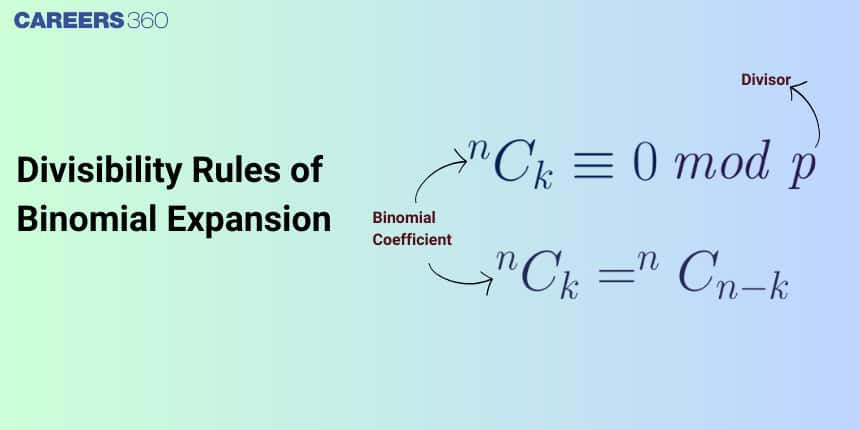Divisibility Rules of Binomial Expansion
An algebraic expression consisting of only two terms is called a Binomial Expression. Expressions with higher powers are difficult to solve. In these cases, Binomial theorem plays a major role. Binomial theorem is used for the expansion of a binomial expression with a higher degree. Binomial theorem is proved using the concept of mathematical induction. Apart from mathematics, Binomial theorem is also used in various fields for statistical and financial data analysis.
JEE Main: Study Materials | High Scoring Topics | Preparation Guide
JEE Main: Syllabus | Sample Papers | Mock Tests | PYQs

This article is about the divisibility rules of binomial expansion which falls under the topic Binomial theorem and its applications. This is one of the important topics for competitive exams.
Binomial Theorem
If
Special cases of Binomial Theorem:
In the expansion of
(i) Taking
Thus,
Using this, we have:
(ii) Taking
Thus,
In particular, for
(iii) Taking
In particular, for
Divisibility Rules:
To find whether the binomial expansion is divisible by an integer,
1. Expression,
2. Expression,
For example:
Prove that
which is clearly divisible by 8 .
1. The expression
2. The expression
3. The expression
In all the above cases
For Example,
The expression
Recommended Video Based on Divisibility Rules of Binomial Expansion:
Solved Examples based on divisibility rules of binomial expansion:
Example 1: Which of the following is true for the number
1) The highest divisor of the number among the given options is
2) The highest divisor of the number among the given options is
3) The highest divisor of the number among the given options is
4) The highest divisor of the number among the given options is
Solution:
This is divisible by
Hence, the answer is the option 3.
Example 2: The number
1) 101
2) 1001
3) 10000
4) 100000
Solution:
obviously 10000 is the correct choice.
Hence, the answer is the option (3).
Example 3:
1)
2)
3)
4) All of these
Solution:
From above it is clear that
Trick:
Hence, the answer is the option (2).
Example 4:
1) 3
2) 19
3) 64
4) 29
Solution:
Hence,
Hence, the answer is option (3).
Example 5: The greatest integer
1) 0
2) 1
3) 2
4) None of these
Solution:
Hence, the answer is option (1).
Also Read
11 Feb'25 08:44 PM
11 Feb'25 08:26 PM
11 Feb'25 08:17 PM
11 Feb'25 08:04 PM
11 Feb'25 07:47 PM
11 Feb'25 10:54 AM
11 Feb'25 10:45 AM
11 Feb'25 10:41 AM
11 Feb'25 10:38 AM
11 Feb'25 12:12 AM

